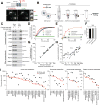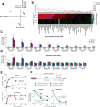Lysosomal metabolomics reveals V-ATPase- and mTOR-dependent regulation of amino acid efflux from lysosomes
- PMID: 29074583
- PMCID: PMC5704967
- DOI: 10.1126/science.aan6298
Lysosomal metabolomics reveals V-ATPase- and mTOR-dependent regulation of amino acid efflux from lysosomes
Abstract
The lysosome degrades and recycles macromolecules, signals to the cytosol and nucleus, and is implicated in many diseases. Here, we describe a method for the rapid isolation of mammalian lysosomes and use it to quantitatively profile lysosomal metabolites under various cell states. Under nutrient-replete conditions, many lysosomal amino acids are in rapid exchange with those in the cytosol. Loss of lysosomal acidification through inhibition of the vacuolar H+-adenosine triphosphatase (V-ATPase) increased the luminal concentrations of most metabolites but had no effect on those of the majority of essential amino acids. Instead, nutrient starvation regulates the lysosomal concentrations of these amino acids, an effect we traced to regulation of the mechanistic target of rapamycin (mTOR) pathway. Inhibition of mTOR strongly reduced the lysosomal efflux of most essential amino acids, converting the lysosome into a cellular depot for them. These results reveal the dynamic nature of lysosomal metabolites and that V-ATPase- and mTOR-dependent mechanisms exist for controlling lysosomal amino acid efflux.
Copyright © 2017 The Authors, some rights reserved; exclusive licensee American Association for the Advancement of Science. No claim to original U.S. Government Works.
Figures




References
-
- Ballabio A, Gieselmann V. Lysosomal disorders: from storage to cellular damage. Biochimica et biophysica acta. 2009 Apr;1793:684. - PubMed
Publication types
MeSH terms
Substances
Grants and funding
LinkOut - more resources
Full Text Sources
Other Literature Sources
Molecular Biology Databases
Research Materials
Miscellaneous

